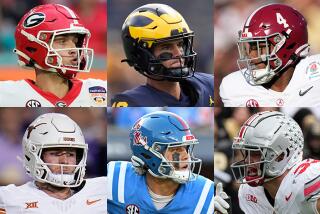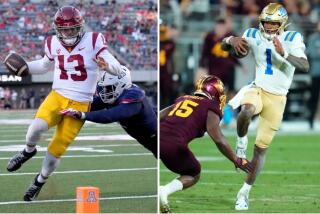WORLDS APART
- Share via
NEW ORLEANS — The roads taken by the quarterbacks in Tuesday night’s Sugar Bowl could not have been more diverse.
Virginia Tech’s Michael Vick all but hopped in a cab out of high school and headed straight to the national title game, paying little heed or dues.
The travel analogy of Florida State’s Chris Weinke reads more like a guy who got bad directions at a gas station and turned what should have been a half-hour journey into a two-day trek on rural roads.
The quarterbacks in Tuesday’s game could not be more different.
Vick is 19, a pup, a redshirt freshman from Virginia who grew up idolizing former Syracuse quarterback Donovan McNabb. Vick was an MTV baby, circa 1980.
Weinke is 27, a collegiate dinosaur, one of the nation’s few balding juniors, an OMOC (old man on campus). His birth predates Watergate, roughly the era folks idolized Donovan, the singer (“They call me mellow yellow”).
Vick lives on a stipend, in a dorm and probably sends his laundry home.
Weinke lives off campus, in a house, and got rich investing in Minnesota real estate in the early 1990s, about the time Vick was playing tether ball in grammar school.
Vick is tomorrow, a quarterback with a rocket arm and the legs to match.
“That’s the quarterback of the future,” Florida State Coach Bobby Bowden says of Vick. “Ten years from now, you’re going to see Vicks running around on campuses.
Weinke is yesterday, a pocket passer with a rocket arm and Dan Marino’s legs. Weinke was running around campus 10 years ago.
“Chris,” Mark Richt, his offensive coordinator says, “is a full-grown man.”
Weinke is money in the bank, poise in the pocket, a poster-child for perseverance and a camp counselor.
“Being the leader on the team, just for the things that happened off the field, was more important than on the field,” Weinke says. “Because this thing could have fallen apart. Being older does make me the leader. Yeah, it does. “
Vick is spontaneous, an internal combustion offensive engine, a guy who can drive his offensive coordinator nuts.
Against Temple this season, Vick left his wristband, the one with all those plays written on it, in the locker room. Instead of retrieving it, Vick borrowed the backup quarterback’s band, no problem except Vick is left-handed and the backup quarterback is right-handed.
The play formations for Vick were different.
So, when Vick called for a quarterback sweep, he ran one way and his teammates ran the other.
Vick turned the mistake into a 75-yard touchdown run.
Kids!
Last spring, Rickey Bustle, Vick’s offensive coordinator, stood before the Hokie Club in Blacksburg, Va., and told the devoted of the freshman who would be taking over at quarterback in the fall.
Bustle: “I told them: ‘I know he’s going to make a lot of big plays this year, I just hope most of them are for us.’ ”
Most of them were.
Vick the quick had a decent freshman season, if you consider decent leading your team to an 11-0 record and averaging 20.4 yards a pass completion. Vick also has tossed 12 touchdown passes and rushed for 580 yards and eight scores.
Father Time
If life was fair, and Tuesday night’s national title were to be awarded to the quarterback most deserving, Weinke would be the hands-down winner.
“It is different for me, being older,” Weinke says. “These are two different approaches.”
Yet, Vick isn’t conceding one yard to Weinke’s experience.
“I love pressure situations,” Vick says. “Whether you’re 19, 20, 25, you have to approach things the same way. Things don’t change because of your age.”
Still, this is a much different experience for Weinke, who has already lived an athletic life of ups and downs.
The nation’s top prep quarterback in 1989 out of St. Paul’s Cretin-Derham High, Weinke spent four days in Florida State’s summer camp before deciding to take the $400,000 signing bonus the Toronto Blue Jays offered in baseball.
Weinke was such a hot football prospect that, when he arrived in Tallahassee, Bowden moved a redshirt freshman named Charlie Ward to punter.
“Charlie thanks me all the time for leaving,” Weinke says, laughing.
Ward, of course, led Florida State to the 1993 national title.
Weinke got rich investing his bonus money, but his baseball career foundered. In seven minor league seasons, he batted .246 with 70 home runs and 413 runs batted in.
One highlight was standing on first base on April 10, 1994, when Michael Jordan collected his first hit for the Birmingham Barons. Weinke almost fainted when Jordan trotted back to the bag and said, “Hi Chris.”
“He took it upon himself to learn guys’ names,” Weinke says of Jordan. “A guy in that position doesn’t have to be like that, but he truly was. He was a class act, who played as hard as anybody I’ve seen.”
Like Jordan, Weinke had trouble hitting the curveball.
He remembers watching with some regret when Florida State beat Nebraska in the 1994 Orange Bowl to win the national title.
What would have happened had he stayed in college?
Would he have been quarterback that night and Ward the punter?
“Maybe I would have never taken a snap,” Weinke says. “Those things we’ll never know.”
Weinke did remember Bowden saying that if he ever got tired of baseball, there was a football scholarship waiting.
Weinke went to the Clemson-Florida State game in 1996 and, afterward, asked Bowden if the offer was still good.
Bowden says it was, and Weinke, like Rodney Dangerfield, went back to school.
Last season should have been the happy culmination of his comeback story. But on Nov. 7, 1998, after throwing 218 passes without an interception for a team that would play in a national title game, Weinke got blindsided in the pocket by Virginia’s Patrick Kearney.
Weinke stumbled off the field and felt a strange sensation in his neck.
It turned out the hit nearly paralyzed him.
Four days later, Weinke had surgery to fuse the C-5 and C-6 vertebra in his spinal cord.
His career appear doomed.
“A year ago, we would not have predicted he would play this year,” Richt says.
Weinke’s recovery was agonizing.
“For six weeks, I was laid up in bed for 23 out of 24 hours in the day,” Weinke says.
Weinke attended last year’s Fiesta Bowl as a spectator, but wondered why he was there. The spinal fluid that leaked into his brain caused excruciating headaches.
“There were times, even at the Fiesta Bowl, where I couldn’t go to practice because I couldn’t get out of bed,” Weinke says. “It was tough. My main concern was to get healthy. I didn’t know if I could play again.”
It was almost as tough watching his backup, Marcus Outzen, struggle in Florida State’s 23-16 loss to Tennessee.
Weinke worked hard to get back. His neck is stronger than ever, doctors say, although the 12-inch surgical scar that runs from the base of his neck down his back serves as a constant reminder of his fragility.
So Good, So Young
Vick’s journey to New Orleans pales by comparison, although he did have decisions to make.
First, Virginia Tech or Syracuse? The high school standout from Newport News, Va., was torn between universities. He could have stepped right in at Syracuse and provided a seamless bridge after McNabb.
But Vick decided he didn’t want people to make comparisons.
“He was my idol all through high school,” Vick says of McNabb, now with the Philadelphia Eagles, “but I felt I had the opportunity to come to Virginia Tech and make a name for myself.”
Vick agreed to go to Blacksburg on one condition: that he be allowed to redshirt his freshman year, an interesting dictum in today’s play-now players’ world.
Virginia Tech could have used Vick last season when starter Al Clark, and his backup, Dave Meyer, were injured in the first four weeks, but Vick would not sacrifice his redshirt season. He took the year to adjust to college life and absorb the Hokies’ offense.
“I knew my place was on sideline,” he says. “I didn’t want to play. I wanted to be in control of the offense, know where the players are, how to read defenses. I wasn’t ready for that.
“Sure, everybody wants to come in and play right away, but everybody that does come in is not successful.”
Vick, in fact, stumbled out of the blocks this season. He sprained an ankle against James Madison in the opener and missed a start against Alabama Birmingham. In his next start, against Clemson, he threw three interceptions.
But it has been a highlight reel since, a second-half surge that vaulted Vick to a third-place finish in the Heisman Trophy balloting.
Who says you can’t have it all at age 19?
“Chris is 27, so what?” Vick says of the age disparity. “I’m going to come to play. It doesn’t matter what age you are, so long as you do what’s required.”
But Weinke wonders if Vick knows what’s really at stake.
You know kids. Vick probably thinks he’s going to play in a national title game every year.
Sometimes, in fact, you have to break your neck to get here.
“You have to take advantage every time you get the opportunity, to give it your best shot,” Weinke says. “Because you don’t know if you’ll get back.
“With all due respect to Virginia Tech, they may not get another chance.”
(BEGIN TEXT OF INFOBOX / INFOGRAPHIC)
Tale of the Tape
CHRIS WEINKE vs MICHAEL VICK
*--*
11 Games 11 377 Passes 153 232 Completions 90 14 Interceptions 5 3,103 Passing yards 1,840 282.1 Avg. yards per game 167.2 25 Passing touchdowns 12 -109 Rushing yards 580 0 Rushing touchdowns 8
*--*
More to Read
Go beyond the scoreboard
Get the latest on L.A.'s teams in the daily Sports Report newsletter.
You may occasionally receive promotional content from the Los Angeles Times.











